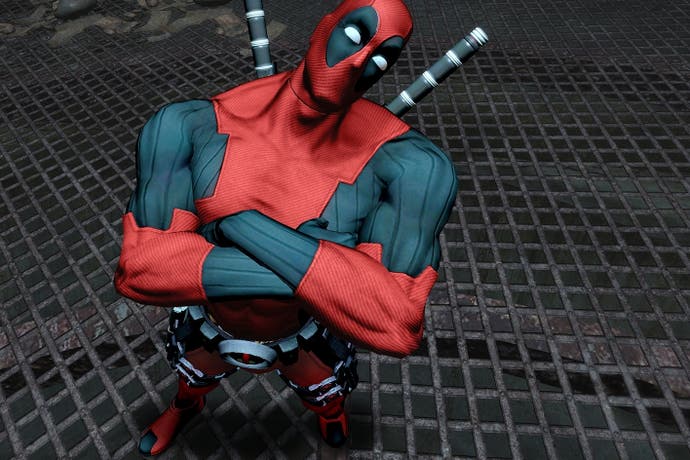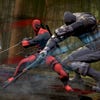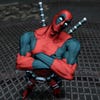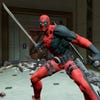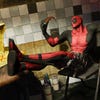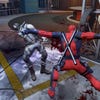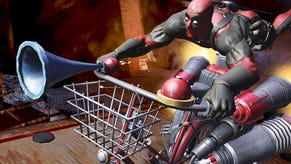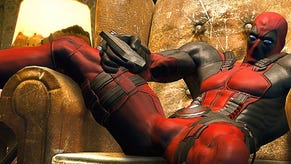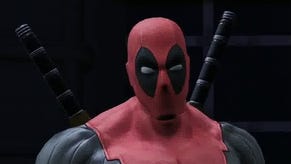Deadpool and the challenge of making a comedy brawler
High Moon's comic book tie-in tries to be funny, but does it try too hard?
Activision's Deadpool game, made by Transformers developer High Moon, is certainly mature when it comes to the violence. But can the same be said of its humour?
The brawler follows in the footsteps of Raven Software's underrated Wolverine game, which also pulled no punches when it came to gore. Deadpool, who according to Marvel lore was created to be able to defeat Wolverine at his own game, likes cutting things up just as much as the grumpy X-Man. In High Moon's game blood spurts as Deadpool's swordplay makes mince meat of an endless stream of disposable goons and his gargantuan arsenal pumps bad guys full of lead.
The violence here fits with the character on which the game is based and will come as no surprise to fans of "the Merc with a Mouth". But, importantly, it's a design philosophy High Moon has employed with every turn.
Deadpool is famous for breaking the fourth wall in the comics, and so he does in the game. He's the only Marvel hero who's aware he's a comic book character, and here he's aware he's a video game character. He's acutely aware, in fact. In one early section, set just after Deadpool crash lands on the abandoned island of Genosha, he notes he must tackle the upcoming area alone after failing to wake any of the X-Men KO-ed by the crash. "It's almost as if it was designed with this in mind," he quips.
Deadpool is also known for being bonkers. According to his backstory he was driven mad by the experiment that gave him Wolverine's healing factor, and he suffers from hallucinations and hears voices in his head. Both are in the game. In one set piece, Deadpool imagines he's been thrown a surprise party, with Rogue sat in the VIP area waiting seductively for him to arrive. He's walking straight into a trap, of course, and Rogue is not a celebrity guest but a prisoner of Mr Sinister's forces.
Deadpool, and the voices in his head, are heard constantly and performed enthusiastically by Nolan North, Mr. Nathan Drake himself, who's clearly having fun with the quirky role. As you play the game Deadpool battles with himself, often arguing about what he believes is happening and what is actually happening. He doesn't take anything seriously, to the annoyance of his allies, and Deadpool's dialogue proves fertile ground for quick-fire one-liners and the odd slapstick moment.
But making video game players laugh with you and not at you is a tricky business. Just ask the industry's chief comedian, Tim Schafer. More often than not comedy video games fall flat, and they rarely sets tills alight.
Making Deadpool ha-ha funny proved to be one of the most difficult design challenges High Moon faced. Go too far and overload Deadpool with one liners and incessant fourth wall-breaking commentary and it would get old quick. Fail to put enough in and you'd be leaving poor old Deadpool with just okay combat and the odd pretty sky box to fend off Sinister's legion of evil mutants.

"It's an ongoing challenge," game director Sean Miller tells Eurogamer. "One of the things we love about Deadpool is he can break not just the fourth wall but some of the stigmas of the action adventure genre. It was a way to bring something fresh. But then you have the problem of sustaining that comedy over a period of time. And, how much talking is too much? That's something we were very cognizant of.
"In fact, early in development we deliberately made a long prototype experience because we wanted to make sure we could do it over time and it wasn't something we could sustain for just five or ten minutes."
High Moon's answer was to make the humour contextual so it reflects the player's actions and the situations and environments Deadpool finds himself in, rather than just popping up seemingly at random. "Keeping it contextual was an important thing," Miller explains. "He does have a certain amount of one-liner goofiness and we have a mechanism for pacing that out so it's not all the time. There are priorities for what you're going to hear and when you're going to hear it. And then there's a significant amount of stuff that's contextual to where you are in the game. You won't necessarily hear the same jokes over and over. You'll hear jokes early in the game you will never hear again, and you'll hear stuff later on. Keeping it contextual helps a lot with that.
"And, we do a lot of user testing. We're playing the game over and over so we hear that stuff over and over. It can get really old pretty fast."
We're playing the game over and over so we hear that stuff over and over. It can get really old pretty fast
Deadpool game director Sean Miller
Early on, after Deadpool meets up with on-again off-again partner in crime Cable, the mutant from the future insists Mr. Sinister is up to no good and must be stopped. Deadpool is bored to tears. "We may want to pay attention," insists one of the voices in his head. "This could explain a critical plot point." Deadpool ignores his own advice and shoots himself in the head.
After working out what the next course of action is, Deadpool shouts: "Now, let's roll out!" "Er, wrong franchise buddy," he says to himself.
At best these jokes spark a chuckle. Some will scoff, but the humour is in keeping with the source material, so you can hardly blame High Moon for that. And Deadpool's running commentary proves oddly compelling. It's like adding a splash of vinegar to what would otherwise be a dry bag of chips. There isn't anybody quite like Deadpool in comics or in video games, and there's a novelty to hearing him banter with himself, NPCs, bad guys and, on occasion, the player.
"We stick with the stuff that still makes us laugh and smile," Miller continues. "We use that as a litmus test. The team has a great sense of humour and we can let them have fun with it. And then we work with Daniel Way [writer of the comic book] to make sure the things we're doing are appropriate for the character and they fit who Deadpool is.
"If it makes you laugh, and then makes three people laugh, it's probably worth keeping in there. We've got a lot of different kinds of jokes. We have some very juvenile humour, we have stuff that's pop culture references, some more subtle types of humour, and then there are some also darker moments for the character, because he is insane. And when he comes down to business he means business."
I imagine Deadpool will prove an enjoyable romp for Deadpool fans. The gameplay rekindles memories of the aforementioned Wolverine game, with what looks like non too challenging combat with just enough depth to keep the player button-mashing until the bitter end (Bayonetta this 'aint). And the humour will hit the mark if you take it as seriously as Deadpool takes his mission. The jokes are blunt instruments wielded thick and fast. As Deadpool might say, "Bang! Bang! Bang Bang Bang Bang!"
But there lingers one area of concern. Deadpool loves the ladies. That's part of his persona in the comics. So it seems right that he should in the video game, but the way this is done borders on the cringe-worthy.
Don't worry. We'll land a real girl someday. This is our game after all
Deadpool talking to himself in Deadpool
An example: Deadpool has another hallucination and imagines Cable as a gorgeous fan girl desperate to meet her idol. Deadpool grabs her breast and does that motorboat thing. Then, suddenly the fan girl is no more, and Deadpool is left with his face in Cable's chest.
"I'd ask what that was about, but I don't want to know," Cable says. "Stupid fantasy!" Deadpool says to himself. "Don't worry. We'll land a real girl someday. This is our game after all."
It's this kind of thing that has seen High Moon's Deadpool compared to Gearbox's Duke Nukem Forever, which some accused of being sexist.
"We have heard that comparison," Miller admits. "The reason people wanted to have a game like Duke Nukem is because it twists things around a little bit. The place we're coming from is a little bit different. One of the things that makes Deadpool resonate with comic book and video game fans is there's a little bit of all of us inside of him. We use the term man-child. He's a grown-up kid. There's a love of the things he's doing that should come through in all of the things he's done.
"And he wants to be liked. He's like a lot of us. In the comics that's a theme you see quite often. He has no idea what he's doing and saying is inappropriate. He means nice things when he's doing it. When he kills people he's taking care of the problem. That pisses off a lot of the other superheroes. But from his point of view: 'I don't understand why you're upset. I took care of the bad guys and I got this bag of gold.'"
For Miller, having Deadpool express his love of the ladies in the game was important. "He's not coming from a place of meanness or abusive nature. He genuinely loves women. He loves them almost as much as he loves the Chimichanga." Political correctness "doesn't even enter into his mindset," Miller says. "He's self-absorbed in that way. Not only does he want everybody to like him, he's actually pretty convinced everybody does like him."
Not everybody will like his video game, that's for sure. But as long as Deadpool fans laugh with the game, and not at it, High Moon will be happy.
